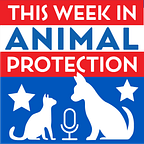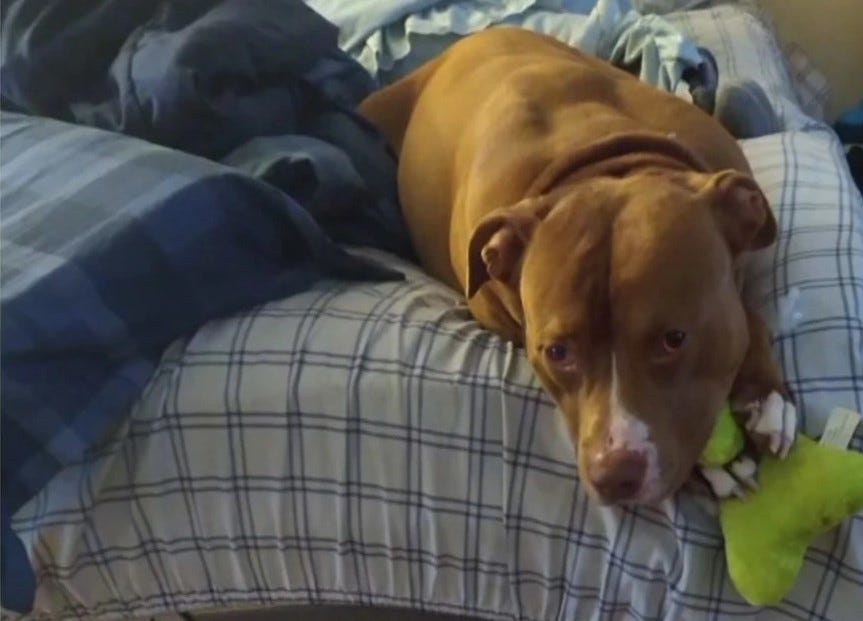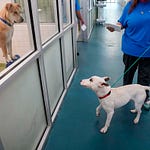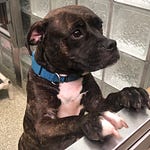
These are some of the stories making headlines in animal protection:
Subscribers can also listen to the podcast above, which includes extended commentary on many of the issues, including why a critic asking Nathan about his “white privilege” and “male privilege” is both insincere and illegitimate as it relates to the animal protection movement. We explain why the question is not intended to discuss the real issue at hand — the morality of killing animals by shelter staff. Instead, it is designed to silence dissent and shield powerful individuals who advocate harmful policies from accountability.
For those who want to skip the news and go straight to the main discussion, it begins at the 23:20 mark.
An update on a story previously reported. Ten families in Keystone, IA, were told by the Benton County Sheriff’s Office that they must get rid of their family dogs because they are or look like pit bulls. Even though these dogs did nothing wrong, the county has “an ordinance prohibiting… ‘any dog which has the appearances and characteristics of being the breed of Staffordshire Terrier, American Pit Bull Terrier, American Staffordshire Terrier, any other breed commonly known as pit bulls.’”
After public outcry, the Sheriff’s Office backed down. It reported this week that “there currently are no plans to remove any dogs from their owners.”
Banning dogs based on how they look is immoral. It is also ineffective. That’s not just opinion; it’s science:
The breed of a dog tells us how they look, not how they behave;
50% of dogs labeled as pit bulls lacked DNA breed signatures of breeds commonly classified as pit bulls;
Dogs targeted for breed discriminatory laws are not more likely to bite, do not bite harder, and such bans do not result in fewer dog bites or bite-related hospitalization rates;
Enforcement is expensive with no measurable impact on public safety; and,
Bans also negatively impact surrounding communities and rescue groups who have to take on the burden of such regressive and selfish policies to save the lives of these dogs.
“When a city has a breed-specific ban, good dogs die. It’s that simple.”
Out of the shadows and into the sun. In more good news for these much-maligned dogs, after 35 years, dogs identified as “pit bulls” are welcome again in Excelsior Springs, MO. The city repealed its former ban.
The Uhrichsville, OH, City Council has voted to embrace TNR for community cats, rather than continuing to take in and kill the poor critters. It’s not only the right ethical decision; it is a smart one for other reasons. In addition to reducing the intake and killing of cats, a community cat program reduces:
Complaint calls to animal control;
Illness in the shelter; and,
Costs (and waste of taxpayer money).
If your community has not yet embraced community cat sterilization instead of killing, The No Kill Advocacy Center’s model community cat ordinance promotes all these benefits. It should be the law in every city, county, and state. Not only does the organization have a step-by-step guide to help you get it introduced, but attorneys with The No Kill Advocacy Center stand ready to help.
This month, The No Kill Advocacy Center turns 18. The organization is asking supporters to celebrate with them by sending just 18 dollars.
In many ways, The No Kill Advocacy Center is still a young organization. But it has accomplished a lot in a short time. When it started, mass killing in shelters was the norm. Only one community saved all healthy and treatable dogs, cats, community cats, rabbits, hamsters, gerbils, and all other shelter animals. It didn't matter if they were young, old, blind, or missing limbs. They were all guaranteed a home, and they all found one. That No Kill community was created by me when I was the local shelter director. Through The No Kill Advocacy Center, we have succeeded in replicating its success in communities across the country, working to return “euthanasia” to its dictionary definition of ending the lives of irremediably suffering animals for reasons of mercy.
We now have No Kill communities across the country, and they all achieved it using our approach. A No Kill nation is within our reach...
As discussed in previous articles and podcasts, a dog named Saint was taken in by ACCT Philly — the Philadelphia, PA, animal shelter. According to the police officer who handed him over to Terrell Walton, a shelter worker, for transport there: “Saint was observed to be in fair condition with no visible injuries, and showed no aggressive behavior.”
Walton then physically abused Saint. “Video footage showed Walton using a rabies or catch pole — a metal pole with a cord loop at one end that can be tightened to help control or restrain animals — to retrieve Saint,” the police officer reported. He also “observed Walton making jabbing motions into the [police] vehicle, and then heard Saint yelp or cry, which compelled the officer to return to his car.”
“As Walton removed Saint from the police vehicle, the officer saw blood and fecal matter in the back and on the ground…
“As Saint was taken into ACCT, the officer attempted to get Walton’s information to report what he had observed, but was prevented by an ACCT employee.”
When he got to the shelter, Saint had “a jaw broken so badly that [he] couldn't close his mouth.”
Instead of providing veterinary care and knowing that Saint’s family was on their way to pick him up, Aurora Velazquez, the director, “instructed staff to kill Saint.” After ACCT Philly killed him, Summer Dolder, the Operations Director, had his body quickly disposed of, refusing to return it to his family. Despite video evidence, the leadership of the pound falsely blamed the police officer for breaking Saint’s jaw.
Adding insult to injury, Kristen Hassen of Austin Pets Alive, an organization that used to champion No Kill, rallied to Velazquez and Dolder. In addition to several comments on Facebook in defense of them (“It’s such a difficult time for shelters and shelter workers”), she reprimanded dog lovers who demanded justice for Saint and his family (“it’s really disheartening this is how you are spending your time”). But Hassen could not silence the public, and Velazquez and Dolder resigned under a cloud of ethical and criminal misconduct.
Hassen then led a live internet roundtable with the two in which she heaped praise on them, calling them the actual “victims” and likening the public demands for accountability, which led to their subsequent resignations to one of the darkest days in the movement: “the likes of which we haven’t really seen.” Hassen not only attempted to portray the public outcry and resignation of the perpetrators as a defeat when it was the opposite, but she ignored what Saint went through. He was physically abused, allowed to languish in pain with no care, subsequently killed, then turned to ash.
Thankfully, the District Attorney’s Office did investigate and issued an arrest warrant for Walton. The D.A.’s Office just announced that Walton “was charged with aggravated animal cruelty [a felony] and a misdemeanor count of animal cruelty.” He is due back in court on August 12. If convicted, Walton faces up to seven years in prison.
Of course, Saint paid the ultimate price for ACCT Philly’s conduct, but he was not the only one to suffer. “I was screaming, I was crying, and I didn’t understand,” said a member of his despondent family. “He died alone.”
While Walton may be held criminally accountable, those whose job it was to protect vulnerable animals but instead killed Saint and then covered it up — Velazquez and Dolder — have not been charged.
It appears that things in Austin are going from bad to worse. A recent exposé in the Austin Chronicle finds that incompetence and uncaring at Austin Pets Alive and the city’s shelter are responsible for a crisis with lethal consequences for the animals.
While the Austin pound turns dogs and cats away, following APA’s philosophy that the public should care for the animals they find or leave them on the street, APA is taking in fewer animals from death row at the city shelter, choosing to import animals from elsewhere. This puts an increasing burden on the public, especially rescuers, to save animals even though APA takes in $10 million per year in donations and Austin has one of the best-funded animal shelter systems in the nation.
















